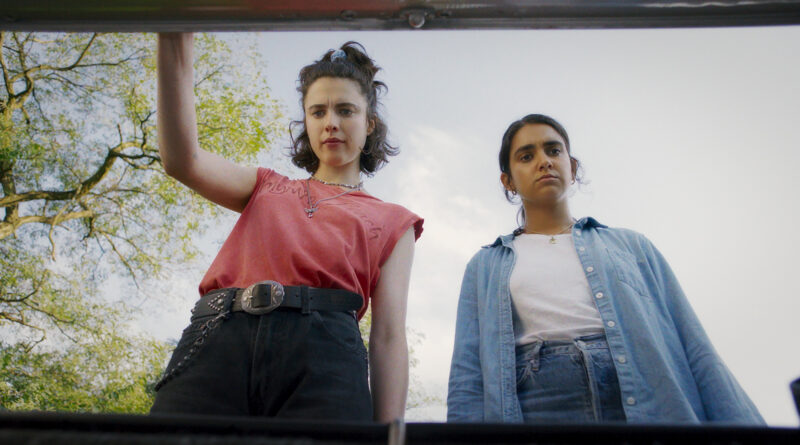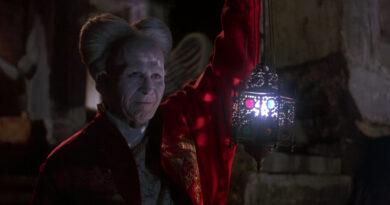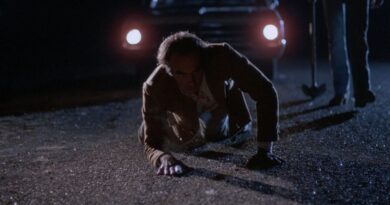Drive-Away Dolls (2024)
If we’ve learned anything about the Coen Brothers, it’s that they’re fairly adept at stories involving mistaken identities, the wrong people in the wrong place at the wrong time, and situations that spiral out of control. This makes the failure of Drive-Away Dolls, a film for which Joel steps back and leaves the directing and co-writing to brother Ethan, all the more disappointing. It’s an unfocused, awkward cross between a road-trip crime comedy and a lesbian sex romp. The former, despite a few amusing lines, is neither funny nor satisfying. The latter is so pronounced, so completely in your face with nudity and sex scenes, it indicates not a serious character study but a straight man’s sexual fantasy.
Taking place in 1999, we begin with Pedro Pascal desperately clinging onto one of cinema’s most reliable and overused MacGuffins: A metal briefcase whose contents are initially a mystery. I obviously won’t spoil the contents for you. I will say that, while juvenile fixations have their place, they contribute nothing of value here. I think it would have been more interesting to keep the contents hidden from the audience so as to stimulate the imagination. I’ll also say that Pascal’s character factors into the story later on, albeit not in the way you’re probably thinking. Why he was included at all, I have no idea. The suitcase was enough of a MacGuffin; not only was another one not needed, its appearance doesn’t make much narrative sense.
Focus then shifts to lesbian best friends from Philadelphia, Jamie (Margaret Qualley) and Marian (Geraldine Viswanathan). Despite their relationship status, they couldn’t be anything less alike; Southern Jamie is a freeloading, outspoken nonconformist whose love life is essentially a series of one-night stands in bars and motel rooms, while Marian is responsibly employed, prefers to dress conservatively, is in the middle of Henry James’ The Europeans, and is so repressed and uptight that we immediately think of Matthew Broderick’s description of Alan Ruck in Ferris Bueller’s Day Off. Indeed, her tone is dismissive and condescending, and her only two facial expressions for most of the film are disapproving glances and deadpan neutrality.
Both women decide to go on a road trip; Jamie needs to clear her head after being unfaithful yet again to her aggressive cop girlfriend (Beanie Feldstein), while Marian is eager to visit her aunt in Tallahassee. Unfortunately, a misunderstanding at a shabby one-way driveaway car service results in their getting a vehicle intended for two gangsters (Joey Slotnick and C.J. Wilson). Stashed in the trunk – with the intention of being delivered to a client in, you guessed it, Tallahassee – is the aforementioned steel briefcase, as well as … something else. The ensuing pursuit down South sees Jamie trying to loosen Marian up (in more ways than one), the gangsters bickering like hateful siblings, and the gangsters’ boss (Coleman Domingo) repeatedly at a loss to account for their incompetence. Oh, and several Linda Ronstadt songs play on the soundtrack.
The film’s biggest issue is that there’s no seamlessness between the journey of the MacGuffin and the sexual odyssey of the two women. It literally seems like separate, unrelated movies are forced into sharing the same space, one typical Coen Brothers fare, the other as gratuitous and salacious as a 1970s sexploitation potboiler. Not helping matters much are a series of psychedelic interstitials, which eventually feature an uncredited cameo by none other than Miley Cyrus; although we know they relate to the Tallahassee client, whose identity will not be revealed by me, I can’t begin to explain why they were designed like brightly-colored acid trips. This is completely inconsistent in tone from the rest of the movie.
By the final act, when all is revealed and we understand the parts played by certain characters and specific things resolve themselves so neatly, it becomes obvious that the film went a long way for very little, which is really saying something given a running time of just eighty-four minutes. We’re also made aware of a major loose end Coen and co-screenwriter/wife Tricia Cooke didn’t tie up. And why did it have to be so immature, so adolescent in its approach to sex? To watch Drive-Away Dolls is to witness a normally reliable filmmaker regressing to the level of a thirteen-year-old, who of course would love dirty talk, and naturally would giggle at the sight of boobies and pee-pee parts.




